China seeks CPEC expansion, control over Afghanistan’s resources in unilateral strategic move

KABUL – In a new unilateral strategic move, China is setting its sights on Afghanistan’s vast lithium reserves, a valuable resource essential for batteries used in phones, laptops, and electric vehicles. This development comes with the approval of the Taliban leadership.
China’s interest in lithium is motivated by its desire to secure a key component for batteries, a critical element as the world increasingly shifts towards electric transportation in response to the challenges of global warming. This interest coincides with China’s recent appointment of Zhao Xing as the first ambassador to Afghanistan since the Taliban’s takeover, marking a significant diplomatic move.
Zhao Xing’s arrival was met with a warm reception from Taliban officials, including Mohammad Hassan Akhund, the acting prime minister, and Amir Khan Muttaqi, the acting foreign minister. This diplomatic outreach signifies China’s intention to engage with the new Taliban administration.
China has been a dominant force in the global lithium battery supply chain for the past two decades. Access to Afghanistan’s lithium reserves, now under Taliban control, could potentially solidify China’s grip on the lithium supply for many years to come. Notably, China already possesses substantial lithium reserves, estimated at 4.5 million tons, and maintains strong ties with the top three nations holding the largest lithium reserves: Chile, Bolivia, and Argentina.
According to Bloomberg, China currently controls 80% of the world’s raw material refining, 77% of the world’s cell capacity, and 60% of the world’s component manufacturing related to lithium batteries.
In a significant gesture, Chinese state companies and various levels of government have provided $50 million in aid to Afghanistan, reflecting a potential shift in relations. The Taliban is now urging China to resume its $3 billion investment in the Mes Aynak copper mines, indicating a desire for economic collaboration.
Gochin, a private Chinese company, is actively exploring Afghanistan’s lithium reserves and plans to invest a substantial $10 billion while generating around 120,000 jobs. Additionally, Afghanistan is gradually becoming part of the China-Pakistan Economic Corridor (CPEC), with construction tenders issued for a rail line connecting Karachi and Mazar-e-Sharif by the Pakistan Railway and China Railway Eryuan Engineering Group. This move underscores the evolving economic ties between the two nations.
China’s pursuit of Afghanistan’s lithium resources and its evolving engagement with the Taliban administration mark significant developments in the geopolitics of the region, with potential implications for the global lithium market and China’s strategic interests.
Culled from Afghanistan Times

